
Summary:
Entrepreneurship in the fantasy sports sector in India holds enormous potential, fueled by the nation’s expanding digital user population and passion for sports. This blog gives you a roadmap of important steps to start successful, ranging from learning about legal compliance to selecting a trustable fantasy app developer.
An effective, easy-to-use app is the key to success in a saturated market. With the correct strategy and technology partner, small business owners can ride this explosive industry wave and monetize their passion for sports as a viable business opportunity.
Entering the fantasy sports business in India is a smart move in today’s digitalized world of sports mania. With Dream11 transforming regular fans into avid contributors, the potential for new entrants is enormous. Start by understanding the market and opting for a popular game such as cricket or football.
Ensure your platform adheres to legal standards—fantasy sports are legal in India so long as they’re skill-based. Create a compelling, mobile-responsive app that leverages live data and facilitates secure transactions.
For instance, Dream11 was founded with a small group of people in 2008 and now has millions of users. With the right strategy, technology, and timing, you can create the next big fantasy sports phenomenon.
Understanding the Fantasy Sports Market in India
India’s fantasy sports market has grown into a multi-billion-dollar phenomenon, merging the excitement of sports with technology. But what’s fueling the boom, and who’s behind it? Let’s dive deep in.
Market Size and Growth
According to Research and Markets, the international fantasy sports market was valued at USD 28.95 billion in 2024 and is projected to grow rapidly to approximately USD 67.03 billion by 2033. This growth indicates a compound annual growth rate (CAGR) of 9.29% between 2025 and 2033.
We know these reports to take an interest in creating your app. If you require more questions to be answered, read the blog on creating a sports betting app to discover in-depth.
Currently, North America dominates the market, accounting for more than 35% of the global share in 2024. The factors, as mentioned earlier, driving this growth include the mass adoption of smartphones, improved internet connectivity, increased interest in sports, and the interactive nature of gamified user experiences.
The Indian fantasy sports industry is growing at a phenomenal rate. Estimated at approximately INR 8,500 crore in 2022, industry specialists believe it will reach over INR 24,000 crore by 2025.
A recent question that arises in our minds is, What is the root cause of the sudden increase?
This growth is accelerated due to expanding smartphone penetration, low-cost data packs, and a continually increasing list of sports fans looking to participate and not just watch passively actively.
Platforms such as Dream11 and MPL have led this revolution, converting crores of passive fans into engaged players by allowing them to build online teams, compete, and earn real cash.
Popular Sports for Fantasy Platforms
Though fantasy sports are played across games, cricket is the king of games in India. The Indian Premier League (IPL) alone drives most of the user traction, courtesy of the league’s humongous fan following and charged matches.
However, cricket is not the sole game around. Football, driven by the Indian Super League (ISL), and kabaddi, through the Pro Kabaddi League, are catching up quickly on fantasy websites. Even basketball is gaining traction. Sports diversification enables platforms to cater to diverse preferences, making them more appealing to a broader audience and more engaging.
How To Plan Your Fantasy Sports Business
Launch of a fantasy sports platform is not all about developing an app and sitting back to see users flock. It involves strategy, planning, and wise choices from the very beginning.
1. Find Your Business Sport Niche
While cricket might be the big gun in India, fantasy sports can accommodate more.
Cricket is followed the most with IPL, T20 World Cup, and Ranji Trophy, drawing millions.
Football is on the upswing with the help of the ISL, Premier League, and the FIFA World Cup fever.
Kabaddi, with the Pro Kabaddi League, finds traction with tier-2 and tier-3 crowds.
Basketball (particularly the NBA) and esports are niche but developing quickly in cities.
Tip: Begin with a single sport where you comprehend the fan culture, and build from there once you develop momentum.
2. Pick Your Business Model
Your monetization model decides how your platform makes—and gains—money. Pick one that aligns with your objectives and user base.
Freemium Model
Provide free games to draw users in, then make money through ads, paid leagues, or in-app purchases.
Paid Contests with Prize Pools
The favorite model—users pay an entry fee to participate in contests and compete for real money.
Ad-Based Revenue
Make money from high traffic with banner ads, sponsored content, or brand sponsorships.
Subscription Model
Provide monthly or yearly plans for unlimited access to premium features or special tournaments.
Whether you are a budding entrepreneur or a developer the monetization strategies are something that is necessary to know.
Example: Dream11 operates the paid contest model, whereas a few smaller platforms use freemium and ad-based models to create volume first.
3. Find a Right Partner to develop and scale your fantasy sports Website
Identify the perfect partner to grow and scale your fantasy sports website. Use proven tech solutions, smooth user experiences, and scalable architecture to propel growth, engagement, and revenue. Partner with experts who share your vision and the fantasy sports space.
If you wish to learn about how fantasy sports apps work, check out our guide to gain knowledge about working in detail.

Legal Requirements of Fantasy Sports in India
India’s fantasy sports market is caught between a tricky legal matrix. Fantasy sports have been declared a game of skill by the Supreme Court and are legal in all but a few states, but non-compliance is not an option. This is how to play the legal wickets.
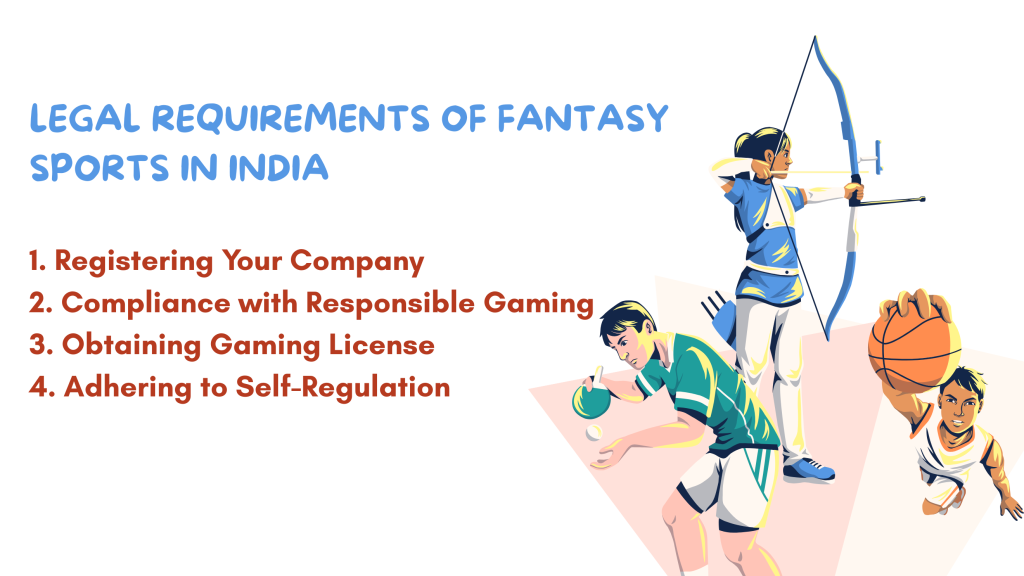
1. Registering Your Company
The initial step is to legally form your business. A Private Limited Company is the most appropriate form of business in India for a fantasy sports company because it gives a professional touch and is convenient to raise funds.
Steps to Register:
Select a Unique Name: Verify name availability on the MCA portal.
Get DIN & DSC: Directors need to possess a Director Identification Number (DIN) and a Digital Signature Certificate (DSC).
File Incorporation Documents: File e-forms such as SPICe+ for incorporation.
Apply for PAN & TAN: These are mandatory for tax and employee-related filings.
Example: If you choose to name your company CrickDreams Pvt Ltd, you will file for incorporation, receive a Certificate of Incorporation from the Ministry of Corporate Affairs (MCA), and be prepared to open a business bank account and commence operations.
2. Compliance with Responsible Gaming and Data Protection
In light of more critical scrutiny over user data, particularly in the gaming industry, ensuring compliance with data protection laws is a given.
Data Protection:
India is preparing for more stringent digital regulation with the Digital Personal Data Protection Act (DPDP Act), 2023.
Pivotal responsibilities:
Get explicit consent for processing and using personal data.
Indicate your Privacy Policy.
Designate a Data Protection Officer (for bigger operations).
Ensure data encryption and security protocols are in place.
Responsible Gaming:
To avoid addiction and safeguard users, you need to adhere to responsible gaming principles:
Age verification (18+).
Establish betting/spending limits.
Show disclaimers (e.g., “This game involves financial risk and may be addictive”).
Offer self-exclusion choices.
To know regarding legal compliance for a fantasy sports app, refer to our guide and have legal compliance for developing a fantasy sports app in detail.
Example: Websites such as Dream11 provide users with self-exclusion options and show a pop-up alerting users following extended playtime. You can enforce similar features to make you perceive as a secure and responsible website.
3. Obtaining GST, PAN, and a Gaming License
GST Registration:
Online gaming service providers, fantasy sports websites are liable to pay GST at 28% (on the entire contest entry fee, after the July 2023 GST Council decision).
Steps:
Register for GST through the GST portal.
Maintain proper invoicing and GST compliance.
Submit monthly and annual GST returns.
PAN:
All businesses need a Permanent Account Number (PAN) for tax purposes and financial transactions.
Gaming License:
Fantasy games based on skills are not gambling and do not need a license under the Public Gambling Act, 1867, in the majority of Indian states.
But what about some special gaming laws specified for some states?
Nagaland and Sikkim have special gaming laws; you might need a license to operate there. Acquire a Skill Gaming License (Nagaland Online Games of Skill license) if you plan to have a pan-India model to gain legal protection.
A detailed structure about the licence requirement in fantasy sports is captured in our blog – What Type Of License Is Required for a Fantasy Sports App. Check for the detailed knowledge.
Example: In case your platform hosts real-money fantasy cricket and you are operating in Nagaland, having the Nagaland skill gaming license gives you legal validity across various states.
4. Adhering to Self-Regulation (AIGF/FIFS Guidelines)
Although India does not have a single central law governing fantasy sports, industry associations such as AIGF (All India Gaming Federation) and FIFS (Federation of Indian Fantasy Sports) have established self-regulatory guidelines.
Membership of these associations can facilitate:
Establishing trust with users and investors.
Keeping oneself abreast of legal amendments.
Obtaining certifications attesting to the fairness of your platform.
Important self-regulatory guidelines:
Ensure game fairness via RNG-certified algorithms.
Have transparent scoring systems.
Follow KYC standards for verification of users.
If you wish to know regarding the legal overview in India regarding the fantasy sport app, then get detailed information in our blog, Indian Law for Fantasy App.
Example: Dream11 is an FIFS member and abides by its charter, including RNG certifications and fairness audits. Being a member of such an association can enhance your platform’s credibility.
Building the Fantasy Sports Platform
After you’ve taken care of legal formalities and regulatory requirements, it’s now time to turn your fantasy sports vision into a reality. Your platform is the core of your company — it’s where your users will interact, participate in contests, make transactions, and communicate with your brand.
Here’s a list of the major technical and strategic choices you’ll have to make while creating a fantasy sports platform in India.
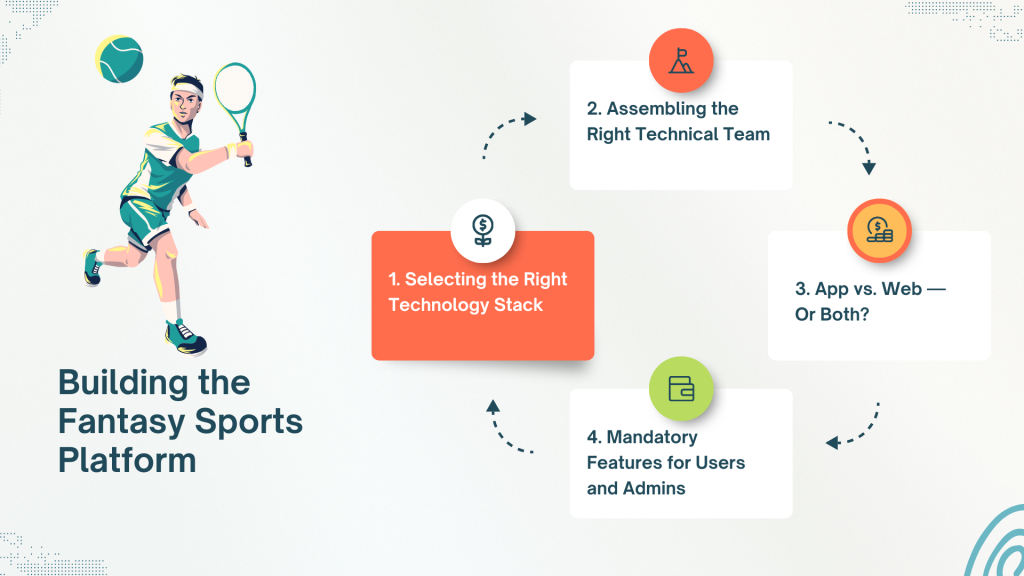
1. Selecting the Right Technology Stack
Selecting the appropriate technology stack is important as it defines your platform’s performance, scalability, and security. Your tech stack should have real-time updates, handle thousands of simultaneous users, and secure sensitive user information.
If you’re developing a fantasy cricket application like BatBazi, you’ll be requiring real-time match data streamed into the application. You might opt for React Native for mobile, Node.js for scalable backend APIs, and MongoDB for dealing with large amounts of player stats and user data.
Key Technology Components:
| Function | Recommended Technology Options |
|---|---|
| Frontend (UI/UX) | React.js, Vue.js (Web), Flutter, or React Native (Mobile) |
| Backend | Node.js, Django (Python), Laravel (PHP) |
| Database | PostgreSQL, MongoDB, MySQL |
| Real-Time Data | Socket.IO, Firebase Realtime DB, WebSockets |
| Payment Gateway | Razorpay, PayU, Cashfree, Stripe |
| Hosting/Cloud | AWS, Google Cloud, DigitalOcean |
| Security | SSL encryption, JWT for authentication, 2FA, DDoS protection |
2. Assembling the Right Technical Team
If you are not a tech founder, you will have to bring on board or collaborate with programmers who know gaming logic and scalable architecture.
Roles to Bring On Board:
- Frontend Developer: Web and mobile UI/UX.
- Backend Developer: APIs, data manipulation, logic.
- Mobile Developer: App development for Android/iOS.
- DevOps Engineer: Scalable deployment to cloud, scaling, monitoring.
- QA Engineer: Ensures smooth and bug-free user experience.
- UI/UX Designer: Develops intuitive and good-looking design.
You can opt for:
- In-house team – Ideal for long-term ownership and IP safeguarding.
- Freelancers – Affordable but can be less reliable.
- Agencies – Ideal for MVPs or rapid launches.
If bootstrapping, think about launching a Minimum Viable Product (MVP) with critical features and validating user feedback before scaling.
3. App vs. Web — Or Both?
Whether to go web, mobile app, or both is based on your target user base, budget, and time-to-market requirements.
Mobile App:
Greater engagement (notifications, offline access).
Easier to monetize through in-app purchases.
More appropriate for real-time gaming experiences.
Web Platform:
Quicker to deploy and update.
Lower development expenditure.
Readily accessible on devices.
Begin with a Progressive Web App (PWA) or cross-platform React Native app, and then develop native apps after traction is established.
Dream11 began off-platform primarily, but once the user base was established, it invested extensively in mobile applications to ensure maximum engagement during live matches.
4. Mandatory Features for Users and Admins
A well-functioning fantasy sports site needs to provide an exciting, seamless user experience while providing admins complete control over the site.
Features For Users:
| Feature | Purpose |
|---|---|
| User Registration/KYC | Secure onboarding and compliance with gaming laws |
| Wallet & Transactions | Add/withdraw funds, transaction history |
| Live Match Feed | Real-time scores and player stats |
| Contest Creation/Join | Select matches, create teams, and enter contests |
| Leaderboard & Rankings | View live rank updates during matches |
| Referral Program | Incentivize users to invite friends |
| Push Notifications | Match alerts, offers, and results |
In CrickBanao, users get real-time updates as their chosen players score runs or take wickets, providing them with a dopamine boost that keeps them stuck on the platform.
Admin Panel Features:
| Feature | Purpose |
|---|---|
| Dashboard Overview | Snapshot of user activity, revenue, active contests |
| User Management | Approve KYC, ban suspicious users, view behavior |
| Match Management | Integrate fixtures, manage scoring rules |
| Revenue Analytics | Track entry fee income, bonuses, withdrawals |
| Promotion Management | Run offers, cashback, referral bonuses |
| Customer Support Module | Respond to tickets and inquiries |
| Fraud Detection & Logs | Monitor duplicate accounts, irregular patterns |
Utilize AI-based fraud identification software to identify suspicious activity — like numerous accounts participating in the same contest — that damages platform legitimacy.
Key Factors To Consider for a Successful Fantasy Sports Company in India
Building a fantasy sports company isn’t simply about having a phenomenal platform — it’s about making wise strategic, budgeting, monetization, and partnership choices that create user growth and long-term viability.
If you are about to join the Fantasy Sports Industry, here are some key tips in our blog to assist you in starting a successful business in India
Let’s talk about the major business and operational considerations that can influence your platform’s success in India.
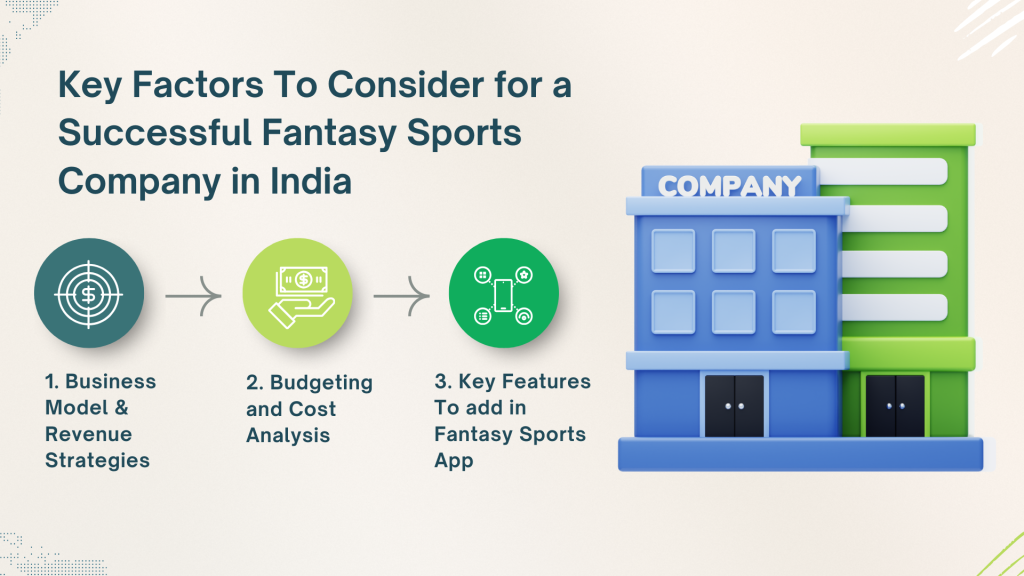
1. Business Model & Revenue Strategies
Your business model determines how you generate revenue and provide value to users. Fantasy sports have several revenue streams — you can employ one or more of the following:
- Entry Fee Contests (Primary Revenue Model)
The users pay to participate in contests, and the platform charges a commission (rake fee), typically 10–20% of the prize money.
Example: When 1,000 users are part of a ₹100 contest, the prize money is ₹1,00,000, and your platform can keep ₹10,000–₹20,000 as commission.
- Freemium Model
Provide free contests with rewards under brands’ sponsorship or ads.
Excellent for user acquisition and retention.
- Advertisements
Show banner/video ads through AdMob, Facebook Audience Network, etc.
Can earn CPM or CPC-based revenue from heavy traffic.
- Sponsorships & Affiliate Marketing
Partner with sports brands or fantasy tools (e.g., prediction sites).
Make commission by selling sports gear or fantasy subscriptions.
Tip: Sites such as My11Circle and Gamezy marry real-cash tournaments with advertisement revenues and influencer collaborations for the best returns.
2. Budgeting and Cost Analysis
Starting a fantasy sports company entails a range of initial and ongoing costs. Having a definite budget allows you to manage burn rate and get investors.
For instance, if you’re starting a fantasy football portal named GoalGamers, your overall initial budget can float around ₹20–₹40 lakhs, depending on technology complexity and marketing scope.
| Area | Estimated Range (INR) |
|---|---|
| Platform Development | ₹10 – ₹30 lakhs (MVP to full version) |
| Licensing & Legal | ₹2 – ₹5 lakhs (including GST registration, legal counsel) |
| Data Provider Integration | ₹1 – ₹5 lakhs annually |
| Server & Hosting | ₹10,000 – ₹50,000/month |
| Marketing & Influencers | ₹1 – ₹10 lakhs/month (varies widely) |
| Payment Gateway Fees | 1.75% – 2.5% per transaction |
| Staff & Operations | ₹2 – ₹5 lakhs/month (small team) |
3. Key Features To add in Fantasy Sports App
The main attention turns towards platform development, and both technical and user experience features are involved.
Major Features:
User Panel: Registration, wallet, join contests, leaderboard.
Admin Panel: User management, contest creation, reporting, payment handling.
Live Data Integration: Integrate live APIs (e.g., from SportsRadar or CricAPI).
Payment Gateway Integration: Razorpay, Cashfree, or PayU for secure transactions.
Security Features: SSL, 2FA, fraud detection.
For learning key features of fantasy sports, refer to our guide and understand the process of fantasy sports construction in detail.
Establishing Strong Partnerships For Your Fantasy Sports Business
Starting a fantasy sports platform is not an isolated activity. The success relies significantly on establishing strategic alliances that fuel your platform’s operations, drive your reach, and increase user trust. In India’s fast-growing and competitive fantasy sports industry, partnerships can be the difference between success and failure.
Let us go in-depth into the key partnerships and collaborations you require to succeed.
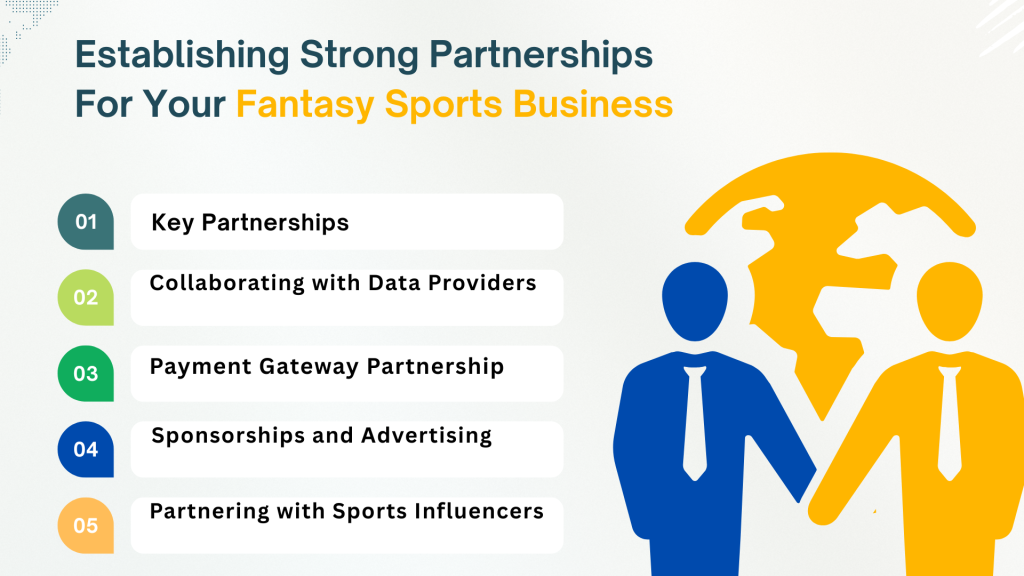
1. Key Partnerships
The success of your platform relies on smooth connectivity with data providers, payment gateways, advertisers, and influencers that further your brand. These relationships guarantee your platform is running smoothly, is reliable, and becomes visible.
Carefully choosing the appropriate partners enhances:
User experience with live, accurate data
Seamless, secure financial transactions
Brand reputation and marketing visibility
Monetization via ads and sponsorships
2. Collaborating with Data Providers
A fantasy sports site thrives and survives on live sports statistics. In order to provide reliable player statistics, real-time scores, game updates, and performance indicators, having good data partners is indispensable.
Why is this so important?
Your users create teams and make decisions on real-time data.
Official player statistics are used in calculating fantasy points.
Inaccurate or delayed data frustrates users and causes churn.
Popular Data Providers in India and Worldwide:
SportRadar: Provides extensive multi-sport real-time data and analytics.
CricAPI: A well-known cricket-specific API, inexpensive and simple to integrate.
SportsMonks: Includes cricket, football, and other major sports with live statistics.
Data Sports Group: Offers live scores and thorough player statistics.
Integration Tips:
Select one that supports the sports you wish to cover.
Look at their update latency; latency of more than 30 seconds can damage user experience.
Negotiate costs based on API calls and data size.
Dream11 utilizes a high-quality data provider to provide live scores and fantasy points updates, making their site live and reliable for millions of cricket lovers.
3. Payment Gateway Partnership
As fantasy sports in India heavily incorporate real-money contests, payment gateway integration becomes an essential aspect of your business.
What to expect from payment partners?
Multi-mode payment support: UPI, wallets, net banking, credit/debit cards.
Quick and secure transactions: SSL encryption, PCI compliance.
Seamless wallet management: Simple deposits, withdrawals, and refunds.
Low transaction fees: To maximize margins without a pinch on users.
Fraud detection: To avoid chargebacks and money laundering.
Top Payment Gateways in India:
Razorpay: High adoption with great UPI and wallet integration.
Cashfree: Great settlements and simple onboarding.
PayU: Popular with e-commerce and gaming platforms.
Paytm for Business: High adoption in Indian digital wallets.
Gamezy adopted Razorpay for instant UPI payments so that users from Tier 2 and Tier 3 cities can easily transact with less friction.
4. Sponsorships and Advertising
Sponsorships and advertisements generate extra revenue beyond entry fees. Not only do they make your platform more profitable, but they also raise brand awareness among your target audience.
How to get sponsors and advertisers:
Highlight your user base, engagement metrics, and demographic data.
Provide ad placements like banner ads, interstitials, video ads, and sponsored contests.
Organize co-branded contests and events during peak sports seasons.
Collaborate with sports wear, energy drink, smartphone, or fintech brands — brands that resonate with your user interest.
Types of Ads:
In-app ads: Non-intrusive videos or banners.
Sponsored competitions: Sponsored prizes or leagues by brands.
Affiliate marketing: Sell related products and earn a commission.
My11Circle offers IPL contests sponsored by mobile and beverage companies, offering the user thrilling prizes while creating massive ad revenue.
5. Partnering with Sports Influencers
Influencer marketing is a game-changer for fantasy sports, particularly in India, where cricket and football stars have gigantic fan bases.
Advantages of influencer partnerships:
- Builds immediate credibility for new platforms.
- Creates compelling content to teach users how to play.
- Generates organic traffic from influencer fan bases.
- Assists in breaking into regional markets with vernacular influencers.
Ways to collaborate:
- Paid campaign on Instagram, YouTube, and Facebook.
- Co-hosting live sessions or webinars and explaining platform features.
- “Play with the influencer” contest or challenge.
- Long-term brand ambassador deals during marquee sports events like the IPL and, FIFA World Cup.
As Dream11 has featured IPL stars like MS Dhoni and Virat Kohli in ads, it has increased sign-ups manifold and earned huge amounts of brand trust.
Marketing Your Indian Fantasy Sports Business
After your fantasy sports website or app is developed and deployed, acquiring users — and plenty of them — is the next step. In India, where cricket mania holds thousands hostage and kabaddi is growing rapidly, a strategic marketing strategy is your most valuable weapon in an overcrowded field.
Want to know how to develop and implement a good marketing plan? This is done to acquire, retain, and monetize users on your fantasy sports portal.
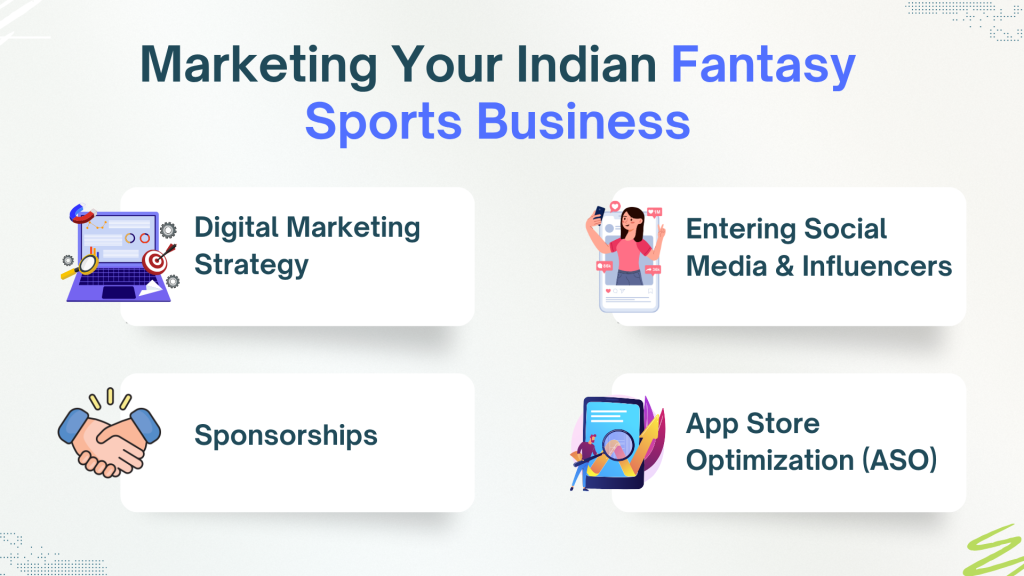
1. Digital Marketing Strategy
Digital marketing is your ace in the hole. Google ads to email campaigns, it’s all about getting your brand in front of the most likely people to play.
Begin with:
Search Engine Marketing (SEM): Bid on terms such as “best fantasy cricket app” or “fantasy football India.” These people are already searching for what you provide.
Content Marketing: Begin a blog (like this one!) with player picks, match previews, and fantasy advice. Fans adore actionable information—bonus points, your SEO gets a boost!
Email Drip Campaigns: Convert sign-ups into regular users through onboarding sequences, league reminders, and bonus notifications.
Pro Tip: Utilize analytics tools such as Google Analytics and Mixpanel to monitor user behavior. You’ll know what’s working—and what doesn’t.
2. Sponsorships
If you need people to trust your brand, get it in front of names they already trust.
Here’s how to use sponsorships:
Partner with Local Tournaments: Sponsor college football or cricket events. It’s cheap, focused, and gives you street-level visibility.
Partner with Sports Blogs & YouTube Channels: Several sports creators in India have large followings. Give them sponsorships or cross-promos.
Explore Jersey Sponsorships: Even semi-professional teams or influencers tend to wear sponsored jerseys. That’s constant exposure for your brand.
Sponsorship isn’t just about your brand logo—it’s about being associated with the community. That’s the key to building a lasting presence.
3. Entering Social Media & Influencers
India exists on social media, and sports enthusiasts are among the most ardent around.
To convert them:
Go Beyond Ads: Host contests, polls, and memes on match days. Have your brand behave as a fan, not a company.
Influencer Partnerships: Micro-influencers (10k–100k followers) tend to have more active audiences than celebrities. Identify cricket influencers, YouTube fantasy tipsters, or Instagram sports accounts.
Live Interactions: Organize Instagram Lives before high-profile matches. Invite experts or influencers to provide insights and interact with the audience.
Launch a fantasy league exclusive to your influencer’s audience. It’s an excellent means of driving installs and user-generated content.
4. App Store Optimization (ASO)
If you’re creating a mobile app (which you should), you can’t afford to overlook ASO. The majority of users stumble upon apps by just searching “fantasy sports” or “IPL fantasy” within the app store.
Enhance your visibility with:
Keyword Optimization: Employ relevant terms within your app name, subtitle, and description.
High-Quality Screenshots: Highlight the UI/UX, live scoring, leaderboard, and wallet functionalities.
Encourage Ratings & Reviews: Invite satisfied users to provide feedback. The higher the rating, the higher the visibility.
Apps ranking in the top 10 for relevant keywords gain 30–40% more downloads compared to lesser-ranked competitors.
Scaling Your Fantasy Sports Business in India
Once you’ve launched your fantasy sports platform and gained some traction, it’s time to shift gears—from launching to scaling. That means reaching a broader audience, converting more users, and building brand authority. Two of the most powerful tools at this stage? Advertising and the right brand ambassador.
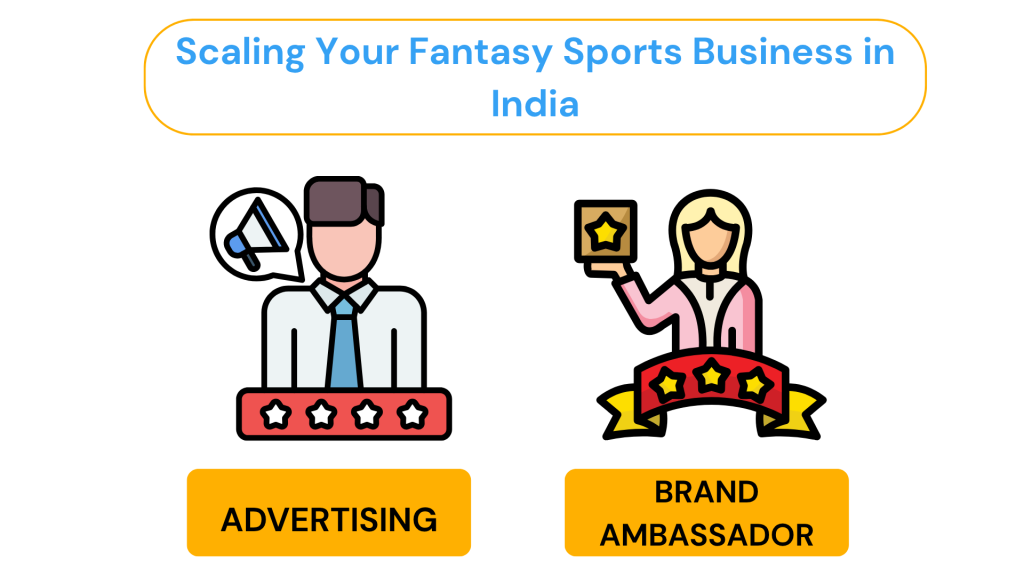
Advertising
Advertising is not about burning money—it’s about burning it wisely. With India having millions of sports enthusiasts, a good ad in the right place can make a passive viewer become a paying player.
Here’s how to get it right:
Performance Marketing: Utilize channels such as Meta (Facebook/Instagram), Google, and YouTube to execute laser-targeted ad campaigns targeted at sports enthusiasts, fantasy participants, or even IPL spectators, region-wise or age group-wise.
Seasonal Pushes: Launch campaigns during peak-interest times such as IPL, Asia Cup, or World Cup seasons. That’s when the fans are most active and will be most likely to register.
Retargeting Campaigns: Welcome back users who installed your app but didn’t play, or users who played once and fell off.
During IPL 2024, Dream11 had a massive ad campaign on digital and TV channels, complemented with in-app promotions. The result? A 20% rise in new users in the tournament month itself. They even employed meme-style content and local language creatives for broader reach.
Selecting a Brand Ambassador
Face it—India adores celebrities, particularly Bollywood and cricket stars. Joining your brand with the right face can instantly gain visibility, credibility, and downloads.
Why brand ambassadors are important:
Instant Recognition: A famous face generates instant attention for your app—even for non-fantasy players.
Trust Factor: Followers are more likely to test a platform supported by a personality they respect.
Emotional Connect: Sports is an emotional game. Using a popular sports personality deepens your brand’s emotional connection.
My11Circle experienced explosive growth when they appointed Sourav Ganguly as their brand ambassador. It provided the brand with an “expert-backed” authority. In 2024, having onboarded Shubman Gill attracted the younger Gen Z audience, resulting in a sharp increase in app downloads and activity from Tier 2 and Tier 3 cities.
RedSeer’s report indicates that fantasy sites with celebrity brand ambassadors experienced up to 1.5x higher engagement when the major tournament season was at its peak.
Challenges and Solutions For Starting a Fantasy Sports Business In India
Challenges and Intelligent Solutions to Operating a Fantasy Sports Company in India And so, you’ve launched your fantasy sports site, established a following, and possibly even signed a brand ambassador. But here comes the game of real interest—maintaining growth and relevance in a rapid-fire, competitive business.
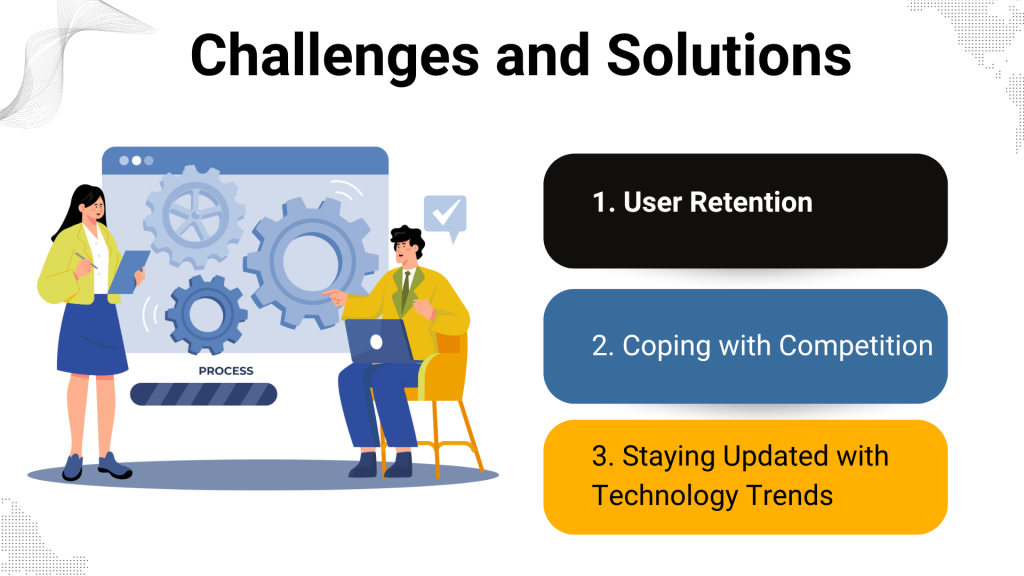
1. User Retention
Acquiring users to download your app is wonderful. But retaining them? That’s the success story.
Challenge:
Too many users sign up during big events such as the IPL or World Cup and then lapse thereafter. They may lose interest, lose money, or just forget about your app.
Solution:
Gamify the Process: Introduce daily challenges, bonus leagues, referral incentives, and streaks.
Push Smart Notifications: Notify users of forthcoming matches, lineup deadlines, and bonus deals—but do it in a personal, not spammy manner.
Loyalty Programs: Treat repeat users to coins, coupons, or VIP status.
Feedback Loops: Conduct in-app surveys and live chat support to continually improve your platform.
MPL (Mobile Premier League) enhanced user retention by adding regular leaderboard tournaments, “spin-the-wheel” options, and cashback on entry fees.
2. Coping with Competition
India’s fantasy sports market is saturated, with heavy-hitters such as Dream11, My11Circle, and fresh entrants each season.
Challenge:
It’s difficult to compete against deep-pocketed brands spending crores on national ad campaigns and celebrity endorsement.
Solution:
Be Hyperlocal: Focus on state-level leagues, local influencers, and regional language content to build a more loyal user base.
Find a Niche: Specialize in kabaddi, football, or even esports fantasy leagues to stand out from the crowd.
Customer Experience is King: Streamline your app to be smoother, quicker, and more intuitive than the competition. Even minor UX enhancements can turn casual players into loyal users.
Master one sport or region to begin with. Win that audience first, then scale.
3. Staying Updated with Technology Trends
The tech world moves fast, and the fantasy gaming space moves even faster. If you’re not evolving, you’re falling behind.
Challenge:
Outdated features, slow apps, or a lack of personalization can frustrate users and push them to newer apps.
Solution:
Regular Feature Updates: Integrate real-time stats, live commentary, and dynamic leaderboards.
Use AI for Personalization: Suggest leagues, players, or contests based on user history.
Remain Mobile-First: Prioritize fast-loading, mobile-optimized interfaces. The majority of users are mobile, and they tend to have slower internet speeds.
Invest in AR/VR and Chatbots: For a more interactive and immersive experience, especially for Gen Z users.
Upcoming Trend: Fantasy platforms are increasingly incorporating Web3 aspects such as NFTs and cryptocurrency rewards. Though still in its early stages in India, it’s worth considering on your watchlist.

Build a Fantasy Sports App Like Dream11 With a Fantasy App Developer
Now that you know the landscape, challenge, and growth prospects in the Indian fantasy sports space, the big question is: Who’s going to create your dream platform and scale your business?
Partner with a Fantasy App Developer
With numerous years of experience in developing fantasy sports apps, we excel at designing high-performance, scalable platforms that provide the kind of smooth experience users demand, just like Dream11, My11Circle, or MPL.
Why Choose Fantasy App Developer?
- Custom Fantasy App Development (kabaddi, football, cricket, and more)
- Real-time Game Engine with live scores & player stats
- Multi-wallet & Payment Gateway Integration
- User Management + Admin Panel
- App Store Optimization (ASO) Support
- 100% Legal Compliance Support for Indian laws
Whether you’re going after a niche sport or want to take on the biggies, we provides you with the technology advantage to deploy quickly, scale seamlessly, and engage users more effectively.
Conclusion
India’s fantasy sports industry is booming, but success is not an accident—it requires strategy, technology, and intelligent execution.
In short view the following things must be consider:
- Launch with a defined marketing strategy
- Prioritize user retention and community building
- Apply advertising & brand ambassadors to scale quickly
- Stay ahead by adopting new tech trends
- And most importantly, collaborate with the right development team
If you’re ready to join this high-growth, high-potential space, Fantasy App Developer is prepared to assist you in creating a world-class fantasy sports app that fans will adore.
Let’s build the next big thing in fantasy sports.
FAQ
Yes, fantasy sports are a game of skill and legal in a majority of Indian states. But it’s always a good idea to follow local regulations and take necessary certifications like self-regulation from FIFS (Federation of Indian Fantasy Sports).
Begin by doing research on your niche, establishing a lawful company, obtaining the necessary licenses, creating a strong platform (app/website), implementing payment gateways, and marketing your platform.
Focus on niche markets (like kabaddi, local leagues), unique features (AI-based player picks, referral rewards), and strong community through influencer marketing and regional branding.
Leverage digital marketing, app store optimization (ASO), seasonal promotions, and loyalty schemes. Engage users by providing daily contests, personalized push messages, and regular app updates.
Prices differ depending on features, design, and development. A minimal version can range from ₹5–15 lakhs, while a high-end, scalable solution can be over ₹25 lakhs or even more.





